Topiary - gives you THE look, but it's not for the lazy gardener.
Topiary is the art of trimming shrubs or trees into ornamental shapes. I have snapped some photos of some topiary in the Northern Suburbs of Sydney, close to the Harbour. The first two photos show a garden featuring Buxus microphylla ( Japanese Box ) shaped into globe shapes around a terracotta pot fountain. The third photo shows a residence with Topiary "lollipop trees" . These are a variety of Ficus Tree ( Ficus microcarpa var. "Hillii" - Hills Fig ) with a long stalk or trunk, and a ball-shaped bunch of foliage on the top. Below, clinging to the concrete fence is creeping ficus ( Ficus pumila ). On the lower level, a hedge of Murraya paniculata ( Orange Jessamine ) , and to the right, a Cypress hedge. All of these hedges and topiary are high maintainence and require lots of work to keep them looking good. That's OK if you like to impress neighbours and visitors and the "upper class" , but not for me !
In fact, I do not find it fair to change what is natural to decorate, but these works are really neat and striking.

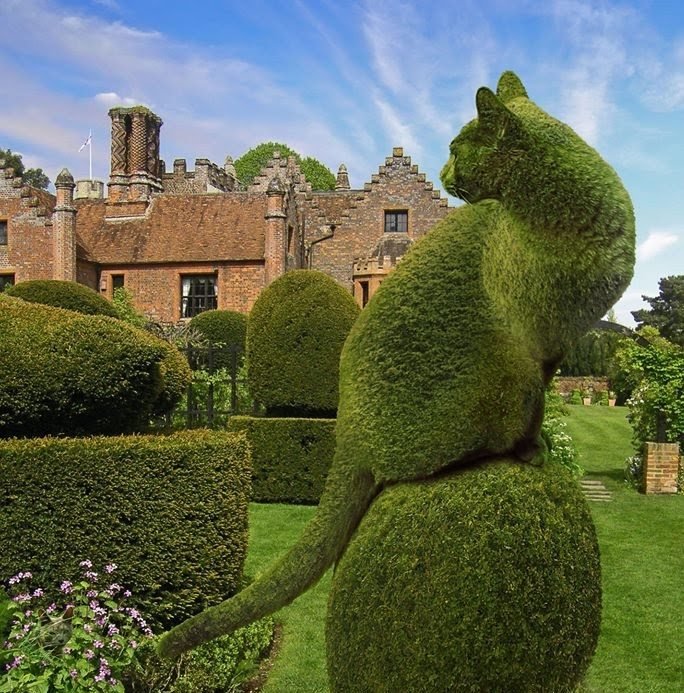
The delicacies of Topiary Art
Do not take a garden shear to your hand and dive into your plants. Leave this work to an expert or get an education on this subject. Otherwise, you may be disappointed.
Before applying the art of Topiary on the plant, that is to say to an expert, before you hand over your bitch, decide as you like. What kind of model do you want to see in your garden? What will be the concept of your garden? Models in independent shapes and stories can show your garden scattered.
If you are going to do this yourself, and you are new to it, start with simple shapes. Balls, pyramids and cubes will have beautiful results.
Plan and make progress. We do not work on a canvas, so we will not be able to reorganize the details that are too big or small.
Take care of your plants. You will get new branches and shoots, and the shape will change. Prun at least twice a year to preserve the shape of your plants.
Which plants will be applied for Topiary?
In order to apply topiary art, permanent trees and trees, which do not spill their leaves, are preferred.
Spruce, juniper, hemlock, servi; rosemary, laurel, boxwood and some ivy varieties are suitable for Topiary.
When Do We Need to Shape Trees and Plants?
You can plant your plants such as late spring or early summer. Since the plants you already use are mostly non-leafing species, they do not present any difficulty in this case.
Congrats, Fav, comment award shared with 1 other.
Topiary is the art of shaping trees and shrubs by clipping and training. And a hedge is a green wall and should be kept razor perfect. Hedges and topiary can provide outstanding features in any garden.Skilled and timely trimming are required to maintain them at their best.
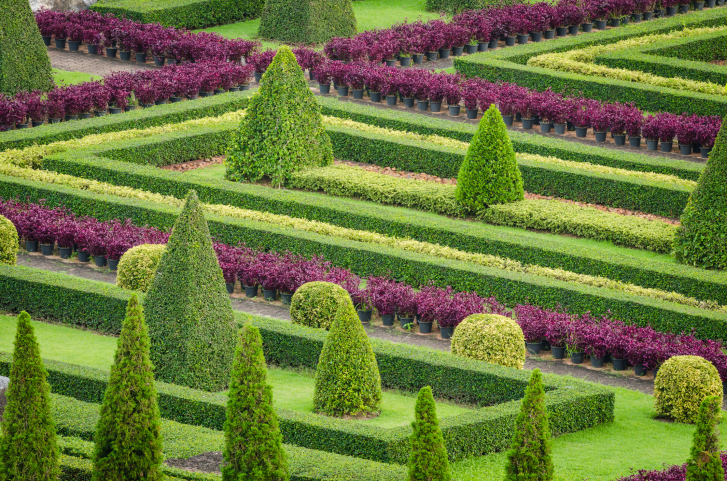
Topiary use to buxus cones and cubes, spiralled conifers, or lilly pillys clipped into balls on sticks as focal points the garden or to create a dramatic effect in a courtyard. when hedges are in active growth during the warmer months of the year, then pruning every 4 weeks or so.
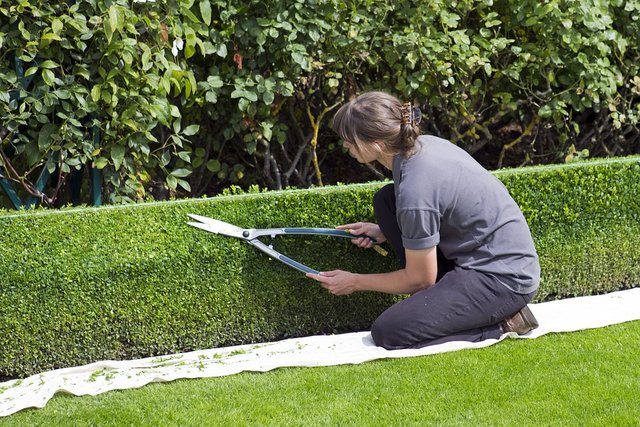
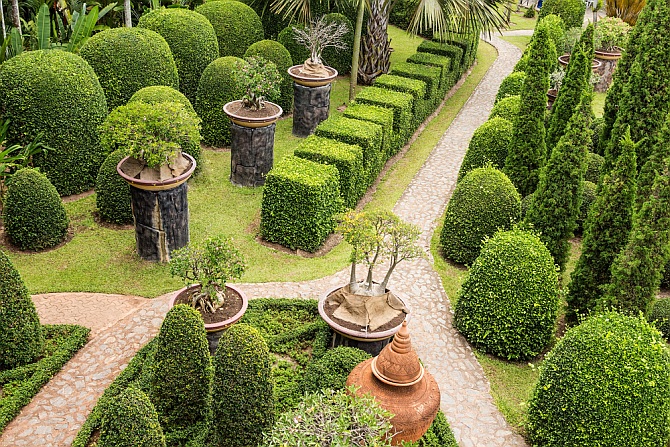
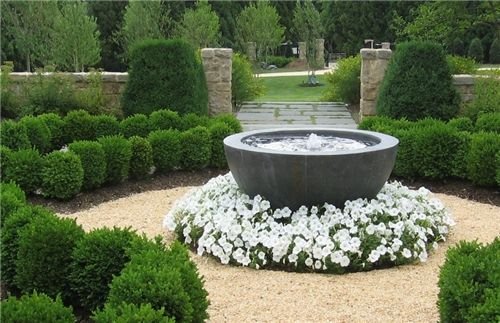
Regularly light haircuts keep hedges tidy and prevent them getting out of hand. If you wait too long before you prune, your hedge will start to look scruffy and it will become difficult to manage.
The most common shrubs used for creating topiary designs are boxwoods, arborvitae and pines. sharp hedge clippers are recommended for large topiaries and sharp pruning shears are ideal for smaller plants.
In terms of general maintenance, topiary specimens should be treated the same as any other valued shrub or plant in your yard.Tend to your plant's water needs, fertilize it and use preventative measures against insects and plant diseases. The topiary is going to require a little more care because it is a manicured form.
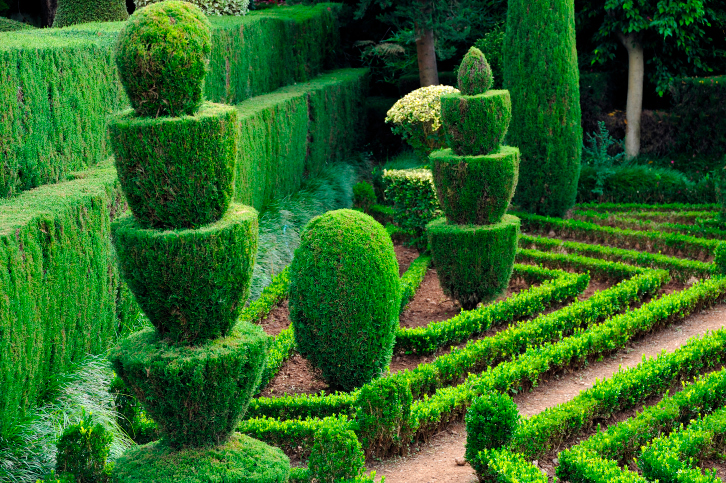
There are many different forms of topiary but the Traditional popular form of topiary where plant has a clear straight stem and a ball on top like a lollypop.
Fabulous comment, great pics. Silly Sausage award goes to you. Well done.
Thanks a lot sir for like and appreciation.
Topiary basically is the art of ornamental gardening, wherein practitioners trim, train, and prune plants into almost any shape and size. Topiary installations vary greatly in size; from pieces as big as trees shaped like ice cream cones to those small enough to fit in handheld cups. The art of topiary itself isn’t exactly a new concept: in fact, it can be traced as far back as 2,000 years ago to ancient Rom
Different types of plants are used for topiaries, though some specific types prove to fare far better than others. Four of such plant types exist: shrubs, hedges, herbs, and vines. For shrubs, the most popular types include boxwood, holly, laurel, and privet. Excellent-looking pyramidal, cylindrical, and obelisk-like designs are best achieved with hedges; herbs are perfect for smaller pieces or as mini gift items (and they have the fragrance to boot); and vines offer perhaps the most possibilities for achieving various forms.

source
Nice Topiary in the shape of a Panda.
Sir @ ctrl-alt-nwo you always shared pretty interesting gardening post with valuable information. Topiaries are plants pruned or shaped into certain forms. It is the horticultural practice of training perennial plants by clipping the foliage and twigs of trees. The word topiary derives from the Latin word for an ornamental landscape gardener.
These plants used in topiary are evergreen, mostly woody, have small leaves or needles.
Pic source Google
I am very thankful to my respectable mentor @ctrl-alt-nwo. You are very kind and generous personality for newcomer steamians.
Stay blessed
@imran498
Great comment, nice pics too !
Thanks a lot for kind support.
Very beautiful plants sharing. In the container gardening world, topiary are often wire frame, filed with sphagnum moss and then planted to resemble any number of geometric forms or even animals.
While topiary are interesting and fun garden additions, they do require a fair amount of maintenance in order to have them develop their full potential. Most topiary start out as wire frames. These frames come in all sizes and shapes imaginable. From small dogs and cats to larger than life exotic animals such as a giraffe or elephant, to a whole host of geometric forms.Once a form is chosen the frames are packed with moist sphagnum moss. The moss is the media that the plants grow in while the frame is the container.
Once the frame is filled with moss the planting process can begin. The plants often chosen are those that are of a spreading habit and root along the stem. However, many other types of plants are chosen depending on the type of figure chosen. The selection is usually based on trying to recreate the illusion of fur or feathers especially when animal forms are being planted. There are also plants chosen for their ability to portray a certain type of ornamentation. What you eventually try to create is a mosaic using plants of different colors and textures that look like a real figure.
Excellent !
There are 2 types of people in the world, those who love topiary trees and gardens and those who don't. Okay, that's a bit simplified, but there's a ring of truth to it. I fall in the first camp; I enjoy the ingenuity and manicured nature.
For all of you who love looking at stunning topiary trees, gardens plants, animals and other shapes.
Picture of extensive topiary garden and walkway of manicured hedge topped with topiary pillars.
Extensive topiary gardens with many geometric shapes surrounding a rock sculpture.
Huge field of topiary balls and other shapes amid large trees.
Large garden with topiary edge forming long walkway surrounded by topiary shapes.
Huge topiary garden containing all kinds of shapes, frames and sculptures.
Garden with a mixture of topiary trees, flowers,fountain and walkway.
Garden with many topiary animals.
Dedicated these amazing topiary pictures to all dear Steemians @ctrl-alt-nwo.
Wonderful comment, lovely pics, thanks.
@ctrl-alt-nwo, That's pretty interesting gardening post. with valuable information. Topiaries are plants pruned or shaped into certain forms. These forms can be as simple as a pyramid or as complicated as a giraffe, elephant or other animal shape. Sometimes topiaries are created out of the plant alone, or they are created as a result of training a plant over a frame. The best plants to choose for a stand-alone topiary are those with small, dense foliage. Those that are trained over a frame should be vining and have dense foliage that will quickly fill in any empty spots and form a dense mat.
I send this video how to maintain this plant.
Sourse:Youtube
that is very very beautiful plants.so good progress. this garden is very amazing.
It's several decades since Trudie Procter optimistically planted a few pencil-shaped, knee-high yews, little knowing what their future might hold. 'I never envisaged they'd turn out like this,' admits Trudie from her Italianate Surrey garden. 'Now when I gaze up at these huge topiary pieces towering above me, the sky behind, I totally marvel at them.' Today, her baby yews have matured into giant topiary pieces that stand silent and solemn in the lawn, their shadows lengthening as the days draw in and the odds against frost shorten. 'They look fantastic coated in frost — every year it's as if I'm rediscovering the shapes anew.
100% like and resteem
@ctrl-alt-nwo
Very nice pics !